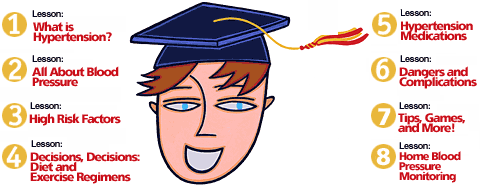



 |
|
|

|
|
Hypertension Lesson 1 - What is Hypertension? 
Back to Hypertension Channel
Hypertension is another name for chronic High Blood Pressure (HBP). This is a serious condition that can ultimately lead to stroke, heart disease, kidney failure, or a variety of other health problems. Sound scary? It can be — IF you don't take care of yourself, and stay in control of your hypertension. Rest assured, however, that there are simple and effective ways of keeping your blood pressure down, and living a long, happy life.
First things first: what exactly IS blood pressure? You probably already know that your heart constantly pumps your blood through vessels in order to disperse oxygen and nutrients throughout your body. Blood pressure is defined as the force of your blood against those vessel walls. The greater (or higher) the pressure, the harder your heart has to work. Generally, having high blood pressure means having a blood pressure reading that exceeds 140/90 mm Hg (millimeters of mercury). The first number is called the systolic pressure, which is the blood pressure as the heart is beating (contracting). The second number is called the diastolic pressure, which is the measure of pressure in between beats, or, while your heart is at rest. Both numbers are important in detecting hypertension and maintaining a healthy heart. Still a little confused? Don't worry — you'll learn more about blood pressure than you ever thought possible in the next lesson. In the meantime, this definition should suffice. When you have high blood pressure, your heart has to work a lot harder than the heart of someone who doesn't have the condition. Your arteries can become thick and stiff and your veins can thicken and narrow. As you and your heart get older, these changes to your blood vessels can lead to severe complications, which is why it is so important to help your body out by listening to your doctor and monitoring your diet, exercise, and medication. We'll explore the specific complications of hypertension later on in the course. Page 1 2 3 4 5 Copyright © 2000-2025 savvyHEALTH.com. All rights reserved.
|
|
|
||||||||||||||||||
|
About savvyHEALTH | Privacy | Feedback | Home
http://www.savvyHEALTH.com/
All contents copyright © 1999-2025 savvyHEALTH, Inc. All rights reserved.
This internet site provides information of a general nature and is
designed for educational purposes only. If you have any concerns about
your own health, you should always consult
with a physician or other healthcare professional. Please review the Terms of Use before using this site. Your use of the site indicates your agreement to be bound by the Terms of Use.
|
|